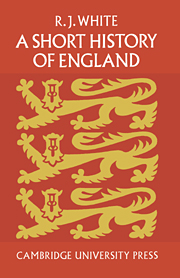Book contents
- Frontmatter
- Preface
- Contents
- Introduction: On the Character of English History
- 1 Roman Britain
- 2 Saxon England
- 3 The Anglo-Norman State
- 4 Common Law and Charter
- 5 The High Middle Ages
- 6 The Nation-State
- 7 The first Elizabethan Age
- 8 The Civil War
- 9 The Withdrawing Roar
- 10 The Century of Success
- 11 The first British Empire
- 12 The Age of Everything
- 13 War and Peace
- 14 Victorian Ages
- 15 Imperial and Edwardian
- Postscript
- Further Reading
- Index
4 - Common Law and Charter
Published online by Cambridge University Press: 14 November 2009
- Frontmatter
- Preface
- Contents
- Introduction: On the Character of English History
- 1 Roman Britain
- 2 Saxon England
- 3 The Anglo-Norman State
- 4 Common Law and Charter
- 5 The High Middle Ages
- 6 The Nation-State
- 7 The first Elizabethan Age
- 8 The Civil War
- 9 The Withdrawing Roar
- 10 The Century of Success
- 11 The first British Empire
- 12 The Age of Everything
- 13 War and Peace
- 14 Victorian Ages
- 15 Imperial and Edwardian
- Postscript
- Further Reading
- Index
Summary
It is sometimes maintained that the story of medieval England is best told as the story of her kings. Certainly at that time the personality of the king played a more decisive part in shaping the story than in periods of more ‘institutionalized’ monarchy. Yet we are not so confident as we once were that kings in losing their personal authority lost very much of their influence on the course of events, or that personal monarchies were ever quite so powerful, for good or ill, as was once imagined. This is mainly because men no longer believe so confidently as they once did in the sovereignty of the human will, even the will of kings. The great personalities of history now play second fiddle to great impersonal forces and movements. Instead of saying, as our fathers did, how fortunate that King John was of a wilful and tyrannical disposition, so that Stephen Langton and the barons found it necessary to compel him to set his seal to Magna Carta at Runnymede in 1215, we are inclined to say that the charter would have come in another form, and another manner, at another time, if John had never been born, or had been a different kind of man, and anyway it was only an acknowledgement of baronial privileges wrung by selfish aristocrats from a debauchee, and that what really mattered was the King's sale of borough charters and the rise of the towns with their up-and-coming middle class, the gravediggers of feudalism.
- Type
- Chapter
- Information
- A Short History of England , pp. 61 - 79Publisher: Cambridge University PressPrint publication year: 1967



